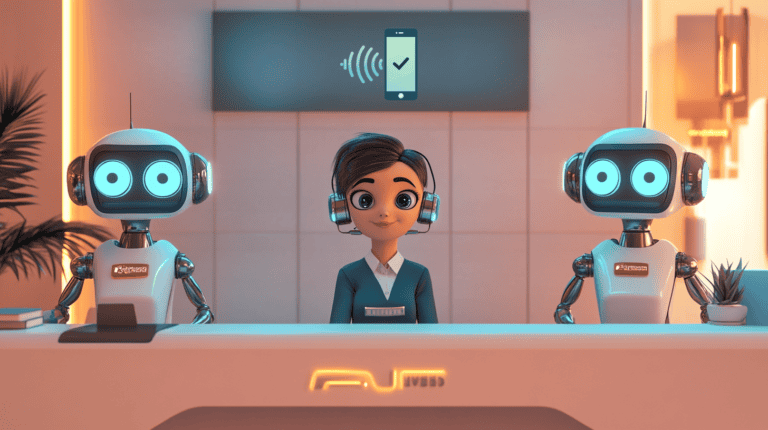AI Answering Services: Why Make the Jump in 2025?
AI answering services will be universally deployed as a crucial component of effective customer communication, as businesses struggle to keep up with the demands of a rapidly changing market. Did you know that poor customer service costs companies over $75 billion annually, with missed calls and delayed responses accounting for a staggering 60% of customer frustration? As we enter 2025, it’s no longer a question of whether to improve your customer communication, but rather how to do it efficiently and cost-effectively, while also supporting your team and staying ahead of the competition.
The Evolution of Business Communication: Why Traditional Solutions Fall Short
Traditional Answering Services: The Efficiency Gap
Recent studies show that traditional answering services handle only 40% of calls within the first minute, with average hold times exceeding 3 minutes during peak periods. This dated approach faces critical limitations:
- Manual data entry errors (occurring in 15% of messages)
- Limited scalability during peak times
- Absence of modern software integration
- High costs for after-hours coverage
- Significant training and turnover expenses
Offshore Virtual Receptionists: The Hidden Cost of Cost-Cutting
While offshore solutions promise savings of 40-60% on paper, businesses report significant hidden costs:
- Average response delays of 12-15 minutes due to time zone differences
- Cultural misalignments affecting 25% of customer interactions
- Integration limitations creating 2-3 hours of additional daily staff work
- Training costs recurring every 4-6 months due to high turnover
- Data security vulnerabilities in 30% of offshore operations
Local Virtual Receptionists: The Scalability Challenge
Though offering better alignment with business needs, local virtual receptionists face their own constraints:
- Average costs of $3,000-4,500 monthly for 24/7 coverage
- 22% increase in missed calls during peak periods
- 15% staff turnover rate affecting service consistency
- Limited technology integration capabilities
- Coverage gaps during holidays and high-volume periods
The AI Answering Service Advantage: A Timely Solution
Technology Maturity
Modern AI answering services have reached a crucial maturity point:
- 99.9% uptime reliability
- Natural language processing accuracy exceeding 95%
- Integration capabilities with 200+ business applications
- Multi-language support for 30+ languages
- Real-time analytics and reporting
Cost-Benefit Analysis
Research shows businesses implementing AI answering services and digital receptionists typically experience:
- 40% reduction in communication costs
- 70% decrease in response times
- 35% improvement in customer satisfaction scores
- 50% reduction in staff overtime
- 90% accuracy in message taking and routing
Industry-Specific Solutions: Real-World Applications
Medical Spa and Wellness Center Implementation
The beauty and wellness industry faces unique challenges, with 45% of booking opportunities occurring outside business hours. AI answering services for medical spas address this through:
Appointment Management
- 24/7 scheduling capability
- 90% reduction in no-shows through automated reminders
- Real-time waitlist management
- Intelligent capacity planning
Customer Experience
- Instant response to common inquiries
- Treatment information delivery
- Preparation instruction automation
- Product information access
Operational Efficiency
- 60% reduction in administrative workload
- Seamless integration with spa management software
- Automated inventory checks
- Staff schedule optimization
[Continue with similarly detailed sections for Legal Services and Professional Services]
Implementation Best Practices: A Strategic Approach
Assessment Phase (2-4 Weeks)
- Analyze current communication patterns
- Document integration requirements
- Set measurable objectives
- Define success metrics
Implementation Phase (4-6 Weeks)
- System configuration
- Staff training
- Integration testing
- Pilot program launch
Optimization Phase (Ongoing)
- Performance monitoring
- Staff feedback collection
- System refinement
- Capability expansion
Addressing Common Concerns
Data Security
- SOC 2 Type II compliance
- HIPAA-compliant operations
- End-to-end encryption
- Regular security audits
Service Quality
- AI accuracy monitoring
- Human oversight
- Quality assurance protocols
- Regular performance reviews
Implementation Complexity
- Phased rollout options
- Dedicated support teams
- Comprehensive training
- Continuous optimization
Looking Forward: The Future of Business Communication
Industry analysts predict that by 2026:
- 70% of business communication will involve AI assistance
- Customer response expectations will decrease to under 1 minute
- Integration between communication channels will become standard
- Predictive service capabilities will emerge as crucial differentiators
Making the Decision: Your Next Steps
- Assess your current communication challenges
- Document your integration requirements
- Research potential implementation partners
- Request detailed proposals
- Plan your transition timeline
Conclusion
The convergence of advanced technology, rising customer expectations, and proven implementation methodologies makes now the ideal time to consider AI answering services. With potential cost savings of 40% and customer satisfaction improvements of 35%, the business case is clear.
Don’t let outdated communication systems hold your business back. Take the first step toward enhanced customer service, improved efficiency, and sustainable growth.
Ready to transform your business communication? Contact us to discuss how our AI answering services can support your specific needs.







